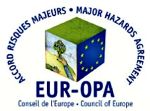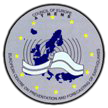Open Partial Agreement (OPA) of the Council of Europe
 OPA is a trans-governmental Agreement for the confrontation of major hazards that operates in the framework of the Council of Europe. It was ratified by Law 2031/92 in Greece and includes 27 members - states.
OPA is a trans-governmental Agreement for the confrontation of major hazards that operates in the framework of the Council of Europe. It was ratified by Law 2031/92 in Greece and includes 27 members - states.
The main objective of OPA is the promotion of the cooperation between member states for the prevention, protection and organization of help in the case of natural or technological disaster, the exchange of experiences and information as well as the encouragement for the establishment of Research Centers.
 OPA has a political and scientific character:
OPA has a political and scientific character:
- At the political level, it is supported by the Ministerial Meetings of the member states of OPA, which take place every five years and are organized by the Committee of Permanent Correspondents of the member-states of OPA. It is also supported by the Committee of National Permanent Correspondents of the member states of OPA, which convenes twice a year. Each member-state participates with one correspondent, which functions as a liaison between the national authorities and the Open Partial Agreement.
- At the scientific level it is facilitated by the Meetings of the Directors of European Centers which come together once e year.
There are two European Centers in our country:
- The European Centre for the Prevention and Forecasting of Earthquakes (ECPFE) under the aegis of EPPO/Ministry of Development, Competitiveness, Infrastructure, Transport and Networks.
- The European Center on Forest Fires (ECFF) under the aegis of the Ministry of Citizen Protection.
The Permanent National Correspondent of the OPA in the Council of Europe is the General Secretary of Civil Protection and the Deputy Permanent Correspondent of the OPA is the Chairman of EPPO and ECPFE.
ΚΑΝΕΠΕ - ΚΑΝΟΝΙΣΜΟΣ ΕΠΕΜΒΑΣΕΩΝ - CODE OF INTERVENTIONS
The Code of Interventions has been translated into English after harmonization with Eurocode 8 Part 3

